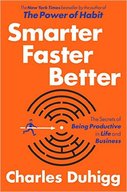 Smarter Faster Better: The Secret of Being Productive in Life and Business by Charles Duhigg, Random House, 2016. Available in several formats.
Smarter Faster Better: The Secret of Being Productive in Life and Business by Charles Duhigg, Random House, 2016. Available in several formats.
I found Duhigg’s ideas in his first book, The Power of Habit, so helpful and so interesting that I quoted from that source in my own book. Now his second book is out, and at first I was very disappointed with it. The thing of it is, he does something in his introduction that no writer or speaker should ever do: he raises an expectation that he never fulfills. (There’s a parallel principle in drama: “If a gun is on the mantle in the first act, it must go off in the third.”)
So, in his introduction Duhigg talks about how he wanted to contact the incredibly talented and productive author, surgeon, and researcher (and speaker, and family man) Atul Gawande. (I write about Gawande in my book and also reference him in this post.) Duhigg tries to set up an interview with him to find out how he has time for everything. I was all excited to read about this. Surely there was a magic formula! I said to Jim, “This book is going to change my life!” But then . . . Gawande can’t meet with him. He’s too busy. (Turns out he’s doing stuff with his family.) Maybe they can meet later. It never happens. And so we never find out what Gawande’s secret is. Gyp! (I suspect that the secret is that there is no secret.) I kept going in the book but found myself flipping through the pages, trying to find material more applicable to my personal life than to the business world, and finally put it down. But Duhigg’s other book was so good that I decided to make more of an effort, and I’m now patiently working my way through it. Here are some insights I’ve gotten so far:
1. The best teams in a company have one factor in common: They foster an atmosphere of trust and openness; any idea can be thrown out for discussion by the group; no one is cut off. Guess what? Openness and trust are key to any relationship.
2. In order to make good decisions you have to accept that you don’t know the future and will make some mistakes. The chapter on decision-making includes a l-o-n-g discussion of poker playing, and I don’t understand cards, so much of that was wasted on me. But I can see the overall relevance.
3. Maybe we missed out by not going to see Disney’s Frozen. Not a great life-changer, but I think we’ll have a party to watch it here at home. It’s very interesting about how the storyline was finally put together for this, the highest-grossing animated movie of all time.
Anyway, I’m going to keep going. I didn’t get the quick-and-easy route to success I was hoping for, but that’s a given. If you can pick up one or two good ideas from every book you read, think of how smart you’re going to be!